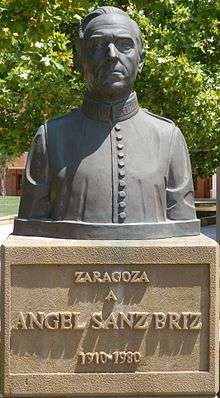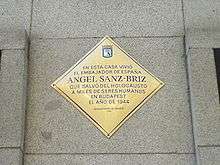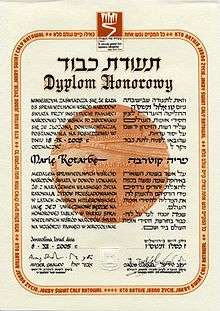Ángel Sanz Briz
Ángel Sanz Briz (28 September 1910 – 11 June 1980) was a Spanish diplomat who served under Francoist Spain during World War II. He saved the lives of some five thousand Hungarian Jews from deportation to Auschwitz.[1][2] Sanz Briz is sometimes referred to as "the angel of Budapest".[3][4][5]
Ángel Sanz Briz | |
|---|---|
.jpg) | |
| Born | 28 September 1910 |
| Died | 12 June 1980 (aged 69) |
| Resting place | Cemetery of Torrero, Zaragoza, Spain |
| Alma mater | |
| Occupation | Diplomat |
| Spouse(s) | Adela Quijano y Secades ( m. 1942) |
| Children | 4 |
| Signature | |
 | |
Early life
Sanz Briz was born on September 28, 1910 in Zaragoza.[6][7] He earned a degree in law at the Central University of Madrid, and then in 1933 entered the diplomatic School in Madrid.[7] At the beginning of the Spanish Civil War he volunteered to join the Nationalist side of the struggle, serving as a truck driver in the Cuerpo de Ejército Marroquí, a unit of Francisco Franco's army created in 1937 and commanded by General Juan Yagüe.[8]
Diplomatic career
After completing his studies in Madrid, his first diplomatic posting was to Cairo.[9] He was sent to Budapest in 1942 where he was the first secretary of the Spanish legation.[3]
Between June and December 1944, he and his assistants issued fake Spanish papers to 5,200 Jews, saving them from deportation to concentration camps.[3][10] he initially received authorization to provide papers to 200 Jews, and continued to enlarge this amount until he reached 5,200.[11] In some cases, he acquired houses in Budapest at his own cost in order to provide shelter for the refugees, which made the difference between life and death for those Jews.[11]
He convinced the Hungarian authorities that Spain, under the dictator Miguel Primo de Rivera had given Spanish citizenship to descendants of Sephardic Jews expelled from Spain in 1492. Primo de Rivera had issued such a decree on December 20, 1924 but it had been canceled in 1930, a fact the Hungarian authorities were not aware of. Sanz Briz dutifully informed the Spanish Foreign Ministry of his actions, which were neither forbidden nor encouraged by Madrid.[12]
In 1944, as the Red Army approached Budapest, he followed government orders to leave for Switzerland. He was replaced by the Italian Giorgio Perlasca, who pretended to be a Spanish consul and continued to issue Spanish visas and to patrol the safehouse system for Jews set up by Sanz Briz.[13][14]
After these events, Sanz Briz continued his diplomatic career: he was posted to San Francisco and Washington, D.C., Ambassador to Lima, Bern, Bayonne, Guatemala, The Hague, Brussels and China (1973, where he became the first Spanish Ambassador). In 1976 he was sent to Rome as Ambassador of Spain to the Holy See, where he died on June 11, 1980.
Sanz Briz himself tells how he was able to save the lives of so many Jews, in Federico Ysart's book Los judíos en España (1973). He is also the subject of the 2011 Spanish television series El ángel de Budapest, based on Diego Carcedo’s book Un español frente al Holocausto ("A Spaniard against the Holocaust").[4]
Personal life
In 1942 he married Adela Quijano y Secades, with whom he had four children: Adela, Paloma, Ángeles, and Juan Carlos.
Death and recognition
Sanz Briz died June 11, 1980 in Rome.[15]
In 1991, he was recognized by the Holocaust Museum Yad Vashem of the State of Israel, who gave his family the title of Righteous Among the Nations. In 1994 the Government of Hungary gave him the Cross of the Order of Merit of the Republic of Hungary.[16] In 2015, a Budapest street was renamed in his honor, as Angel Sanz Briz Avenue.[4][17]
See also
References
- Berendt, Joanna (26 July 2017). "Auschwitz Artifacts to Go on Tour, Very Carefully". Retrieved 24 February 2018 – via NYTimes.com.
- "El silencio y la soledad de un gran diplomático: Ángel Sanz Briz". El Pais. 3 October 2010. Retrieved 31 May 2014.
- "The Angel of Budapest: Ángel Sanz Briz - 4 Corners of the World: International Collections and Studies at the Library of Congress". blogs.loc.gov. 17 January 2017. Retrieved 24 February 2018.
- Society The ‘Angel of Budapest’ becomes immortal in the Hungarian capital 12/ 11/ 2015 at marcaespana.es Accessed 5 January 2018
- Julio Martín Alarcón (10 October 2016). El ángel de Budapest. Penguin Random House Grupo Editorial España. pp. 186–. ISBN 978-84-9069-558-6. Retrieved 24 February 2018.
- Paul R. Bartrop (6 June 2016). Resisting the Holocaust: Upstanders, Partisans, and Survivors: Upstanders, Partisans, and Survivors. ABC-CLIO. pp. 238–. ISBN 978-1-61069-879-5. Retrieved 24 February 2018.
- Solomon Gaon; M. Mitchell Serels (1 July 1995). Del fuego: Sephardim and the Holocaust. Sepher-Hermon Press. ISBN 978-0-87203-143-2.
- "Ángel Sanz Briz, un héroe en Budapest". Retrieved October 4, 2019.
- "Portrait of Spanish ambassador Angel Sanz-Briz. - Collections Search - United States Holocaust Memorial Museum". collections.ushmm.org.
- "Madrid to dedicate one of its streets to the memory of the "Angel of Budapest" - The Diplomat in Spain". thediplomatinspain.com.
- Rescue Story: Sanz-Briz, Angel, at yadvashem.org Accessed 5 January 2017
- "Entrevista a Juan Carlos Sanz Briz, Hijo del "Ángel de Budapest"". Retrieved October 4, 2019 – via www.youtube.com.
- Green, David B. (15 August 2013). "This Day in Jewish History 1992: A Fake Diplomat Who Saved 5,200 Jews Dies" – via Haaretz.
- "Israeli orchestra honors Italian who saved 5,000 Jews from Nazis".
- País, Ediciones El (3 October 2010). "El silencio y la soledad de un gran diplomático: Ángel Sanz Briz".
- "Homenaje a Angel Sanz Briz, el "Schindler español"". 29 October 2008. Retrieved 31 May 2014.
- "Tribute to Ángel Sanz Briz". www.exteriores.gob.es.
External links
![]()



